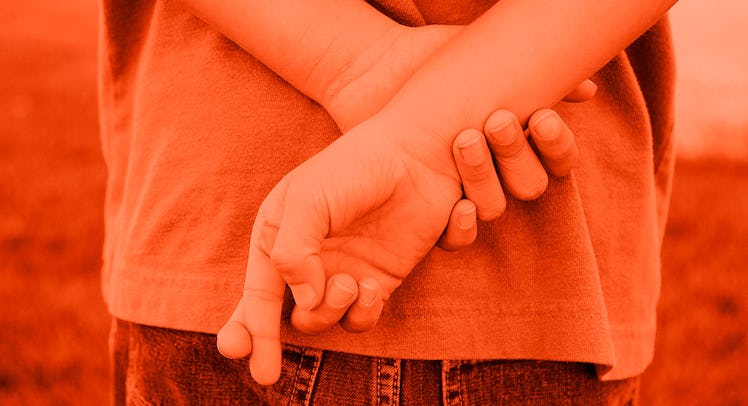Why Kids Lie and Why Parents Should Let Them
Many parents tell kids they should never lie. But the truth is that kids need to know how to lie in order to be a member of society. Just maybe not as much as President Trump.

Lies are enjoying a cultural moment. Not only are today’s children growing up in an era of “fake news” (mind the quotation marks), they are being exposed to a robust national conversation about untruth. But big lies and algorithmic, social media-optimized lies are not the same as the lies we tell every day. Our daily output of untruth keeps the machinery of the world running and keep us from killing one another. There is real virtue in strategic interpersonal dishonesty. On a small scale, lying is a skill. And, yes, that means it is something that should be taught to children.
The truth is that lies get a bad rap despite being an inevitable and often useful part of every human being’s social arsenal. This is not to say that lying should be rewarded, but that parents need to be honest with themselves about dishonesty and what it represents.
Harsh Truth #1: Toddlers Can’t Lie
A two-year-old might say they didn’t eat the cookies while their face is covered in crumbs, but that doesn’t mean they are lying to parents. In fact, from a purely developmental perspective, they are literally incapable of true, premeditated deception. In order for kids to truly lie, they need to understand that people do not share the same thoughts. This is called “Theory of Mind” and toddlers simply have not developed it yet. If a child is operating under the impression that everyone knows the same stuff, then deception is a non-starter.
So, what’s going on when a kid says they didn’t do something they clearly did? They’re just saying what parents want to hear — not to intentionally trick them, but to make them feel better and smile. That’s not so terrible. Is it?
Harsh Truth #2: Parents Should Celebrate The First Lie
Acquiring the ability to tell a lie is a developmental milestone that should be as celebrated as a child saying their first word. Developmentally both tasks require a whole bunch of incredible and impressive brain development.
Here’s what it takes to tell a lie: An understanding that all humans do not share the same thoughts (Theory of Mind), an excellent working memory, empathy to know that the truth might cause distress, and inhibition. Inhibition is the ability to recognize and then suppress the truth. That requires a skill called “metacognition” which is the ability to think about one’s own thoughts. Not to mention all of this needs to work in concert with language capabilities.
A lie is, in short, a really good indicator that a kid’s brain is developing well.
Harsh Truth #3: Lying is a Necessary Skill
Lies grease the wheels of society. They help people get along with each other. We might tell a white lie to save a person’s feelings. We might lie to boost someone’s mood. We might omit a truth to make protect relationships, which is the gist of one of childhood’s great lessons: “If you don’t have anything nice to say….”
So, lying is not really the evil that many parents would have children believe. It is, in fact, an important social skill that can make life more pleasant for everyone.
Harsh Truth #4: Kids Who Can’t Lie May Have Cognitive Delays
Importantly, an inability to lie may point to more significant problems in development. A child who struggles to lie, or who is a habitual truth sayer is exhibiting traits consistent with those on the autism spectrum. People affected by Asperger’s syndrome, for instance, have difficulty with lies. An inability to lie is also consistent with damage to the right hemisphere of the brain. It can also be a sign of prolonged immaturity and lack of development.
Importantly, an inability to lie can also present a child with a slate of social problems. It can affect their ability to make and maintain friends or develop a strong sense of self.
Harsh Truth #5: It’s All About When to Lie
Some parents place to big an emphasis on teaching children not to lie at all. They feel that lies are a sign of moral or spiritual weakness. But those perspectives underplay the fact that societies require lies in order to function. That requires more nuance in teaching a child when it’s okay to lie.
Normally, these lessons occur naturally as a child grows. But there’s nothing wrong with making those lessons explicit. In fact, telling kids not to say anything when they only have mean things to say is essentially telling them to lie. There’s no harm in pointing out that this is a lie of omission and that sometimes, “white lies” in the service of helping others feel better about themselves aren’t so terrible or immoral.
Luckily, if parents can help their children develop a strong sense of empathy and charity, they’ll understand when lying is good, and when it’s being used for less moral purposes.
Harsh Truth #6: Telling a Kid Not to Lie Makes You a Hypocrite
Parents who are tough on lying kids may be setting themselves up for trouble. If a parent doles out angry discipline for lies while also pretending that Santa Claus is real, he or she is sending a mixed message. Kids raised by liars who insist on other people telling the truth often wind up with a complicated relationship with authority. Hypocrisy, it turns out, is worse than some mild fibbing.
This article was originally published on